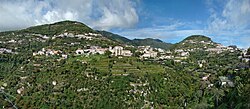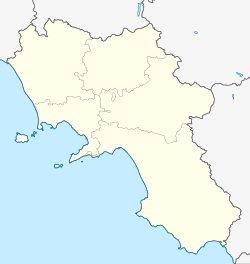You can help expand this article with text translated from the corresponding article in Italian. (January 2022)Click [show] for important translation instructions.
|
Scala | |
|---|---|
| Comune di Scala | |
 Scala viewed from Ravello | |
| Coordinates: 40°39′N14°36′E / 40.650°N 14.600°E | |
| Country | Italy |
| Region | Campania |
| Province | Salerno (SA) |
| Frazioni | San Pietro, Santa Caterina, Campidoglio, Minuta, Pontone |
| Government | |
| • Mayor | Luigi Mansi |
| Area | |
• Total | 13.86 km2 (5.35 sq mi) |
| Elevation | 360 m (1,180 ft) |
| Population (31 December 2017) [2] | |
• Total | 1,516 |
| • Density | 109.4/km2 (283.3/sq mi) |
| Demonym | Scalesi |
| Time zone | UTC+1 (CET) |
| • Summer (DST) | UTC+2 (CEST) |
| Postal code | 84010 |
| Dialing code | 089 |
| Patron saint | St. Lawrence |
| Saint day | August 10 |
| Website | Official website |
| Part of | Costiera Amalfitana |
| Criteria | Cultural: (ii)(iv) |
| Reference | 830 |
| Inscription | 1997 (21st Session) |
| Area | 11,206 ha (27,690 acres) |
| Buffer zone | 11,857 ha (29,300 acres) |
Scala is a town and comune in the province of Salerno in the Campania region of south-western Italy. It is located on a rocky hill c. 400 m above sea-level and is part of the Amalfi Coast.[ citation needed ]

